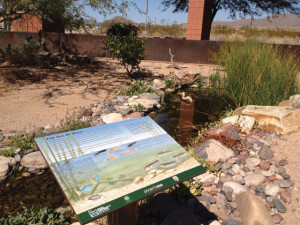 Those interested in desert preservation recently came together to celebrate completion of the final phase of the cienega at Mesa Community College (MCC) at Red Mountain, located at 1710 E. McKellips Road.
Those interested in desert preservation recently came together to celebrate completion of the final phase of the cienega at Mesa Community College (MCC) at Red Mountain, located at 1710 E. McKellips Road.
The fourth and final phase of the MCC cienega was the installation of educational signage. The signs were funded through a $54,736 Heritage Grant from the Arizona Game and Fish Department to educate and alert visitors of the sensitive nature of the cienega, and provide information on the importance and natural history of desert wetlands and the species living within this unique habitat.
“These signs represent not only the completion of a six-year journey to providing our students and public with a top-notch exhibit and reserve, but also the commitment of the Red Mountain team to MCC’s mission,” said Andrew Holycross, MCC Biology Faculty.
MCC Life Science Department Chair Andy Baldwin said, “Finding a cienega while hiking in nature is truly like finding a gem in the desert. This reconstructed oasis at MCC Red Mountain has been years in the works, and just recently has it all finally come together into one most impressive outdoor display.”
“Red Mountain’s cienega has native plants and animals, including several endangered species, some of which are already reproducing,” he continued. “The new signage explains the importance and functions of cienegas, all of which can and will be incorporated into classroom curricula. I encourage everyone to go check it out. Once people realize the beauty of the campus, they often never look anywhere else for classes.”
The first phase of the cienega project was the installation of a wetland surrounded by native vegetation in the central courtyard of the campus. This phase was complete in April 2010, with the introduction of longfin dace fish to the pond. The cienega uses reclaimed water from rooftops, and is supplemented by city water. A large underground reservoir moderates daily and seasonal temperature fluctuations. Water is cleansed using an advanced biofiltering system.
Phase two, completed in 2012, involved the installation of a gated three-foot barrier fence to protect cienega wildlife. Tortoises were introduced in October of the same year.
Phase three involved the introduction of populations of endangered wildlife in cooperation with Arizona Game and Fish Department; the United States Department of the Interior Fish and Wildlife Service; and the Phoenix Zoo. Endangered desert pupfish were introduced in November 2014 and are thriving.
MCC at Red Mountain received a 2014 Founders Conservation Award, from the North American Native Plant Society, recognizing its extraordinary contributions to the conservation, protection or restoration of the natural heritage/native flora of North America.
Mesa Community College is nationally recognized for its service-learning, civic engagement and innovative educational programs, which include university transfer, career and technical, workforce development, and lifelong learning. Host to 40,000 students annually, MCC offers more than 195 degrees and certificate programs at its two campuses and additional locations.
MCC’s student body hails predominantly from the East Valley of Phoenix, and includes veteran, American Indian and international students who enrich the learning experience. Award-winning faculty are dedicated to student success, providing the education and training, which empowers MCC students to compete locally and globally. Celebrating its 50th anniversary this year, MCC is one of 10 colleges comprising the Maricopa County Community College District. The district also includes the Maricopa Corporate College and two skill centers.
For additional information about Mesa Community College, visit www.mesacc.edu.

